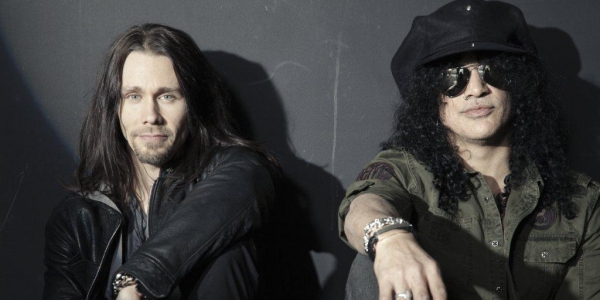Meeting Slash is admittedly a slightly surreal experience – after all, no one human being has done more for the combined sales of top hats, Jim Beam, Playstation guitar-controllers or sunburst Les Pauls, and to contemplate the musical elite he’s shared a stage with is truly mind-boggling. But in person he is softly-spoken, self-deprecating and good-humoured, the greying stubble and fidgetty, now cigarette-free fingers serving as outward reminders that he is in fact a human being, and not an avatar or fictional character on South Park. Speaking from behind mirrored sunglasses and clearly slightly unaccustomed to being up and about in the AM, he is nevertheless enthusiastic about the imminent release of his new album Apocolyptic Love, and the formation of his new band The Conspirators – particularly the soaring and majestic contributions of new lead vocalist Myles Kennedy, who was at one point considered as a possible replacement for Scott Weiland in Velvet Revolver. Indeed it was Kennedy who deputised for Axl Rose at Guns N’ Roses’ recent induction into the Rock and Roll Hall of Fame, and whom Slash selected as a live stand-in for the multiple vocalists of his previous solo outing.
Conceding only that the new album is “dark” and “heavy”, Slash is adamant that there is no grand scheme or overarching concept to the record, and cautions against reading too much into it. “This record was written on the road, was performed live, and is really just a four-piece rock band,” he explains. “I didn’t get into overdubs, or embellishing anything. There’s a million things I could have done with this record, just to make it musically more ‘intricate’ with harmonies and all that, but [producer] Eric Valentine and I just wanted it to keep it as live and in-your-face and stripped-down and honest as possible. The only outside instrument we used was a tiny bit of piano on one song.”
Several mini-documentaries on the making of the album were recently released on YouTube and show a band clearly revelling in the creative process, interacting with a distinct lack of hierarchy or ego in a strange purpose-built hut, which was constructed to maintain a band dynamic whilst retaining the necessary audio separation – an innovation which Slash describes as “a mini revelation”. While he is often touted as a guitar purist, one wonders whether he ever feels straight jacketed by this, or by the instrument with which he has become so indelibly associated. “Yeah, sometimes I feel the need to get away from the guitar itself. Like, when you pick up a guitar, you tend to know what you’re doing and what you’re about to do. Sometimes the best way to get away from that is to pick up another instrument,” he says. “I’m a fuckin’ terrible piano player, but I can write on it, much like I type: very slowly. But I come up with ideas on piano that I wouldn’t necessarily come up with on guitar. Having said that, I find that I’m still exploring the way the guitar works in a regular, sort of, standard setup, and seeing what I can come up with within that and still make it unique.”
Noting that the timeframe between his records is actually decreasing, and that apparently some fifteen songs were recorded in the Apocalyptic Love sessions alone, Slash speaks about his career with the fervour of a man at the beginning of a new endeavour, rather than a grizzled old veteran. Now that the new band is gelling, and now that he has a singer who doesn’t complain and actually turns up to the venues on time, and with a large-scale tour planned for later in the year, the focus is decidedly on the future. But is there any place for nostalgia, or revisiting old ideas? “Nah,” he shrugs. “There’s tons of ideas over the years that haven’t been utilised, but I hate to go backwards and look through old stuff… If there’s an old riff that’s been bugging me for years, then it might get used. But if it’s just one of those things that I thought was cool at the time and never got used, chances are I’ll just throw it away without a second thought.”
BY BENN LAIDLOW







